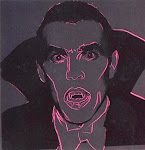The first time I read this (which, incidentally was on a 12 hr train ride from Toronto to NYC), I remember being really suspicious of Quincy Morris - he comes back suddenly into the picture, and then when he shoots the bat (or attempts to) I couldn't help but think that there was more to him ... or perhaps I've been watching too many episodes of 'Columbo' ... it seemed too pathetic to just have him make them jump, and there be no real other discernable reason for the shooting. I suppose it reinforces his Americanness (remembering that that was really still a very new idea), and of course again alerts us to the presence of the bat, but was the window shattering necessary? I'm unconvinced.
In other news, Van Helsing's philosophising provides some interesting rationalising of the presence of the 'Un-Dead' among us. Do we at this point find ourselves becoming convinced by his logic, like Dr Seward? There is, after all, quite a strong message to the contemporary audience, and perhaps to us too, regarding the supernatural, and a deeper spiritual realm, when he says:
Ah, it is the fault of our science that wants to explain it all; and if it explain it not, then it says there is nothing to explain. But yet we see around us every day the growth of new beliefs, which think themselves new; and which are yet but the old which pretend to be young - like the fine ladies at the opera.
Remember at this time that science was replacing religion as the main guiding factor. As it advanced rapidly, people became more and more obsessed with the idea of fact, and being able to prove things, as the structure of the novel emphasises. Whatever Stoker's metaphorical message, it is certainly true that the logical and rational argument laid out by Van Helsing is carefully thought out to make most sense to the discerning late Victorian reader... Shame the accents are less convincing eh?!
